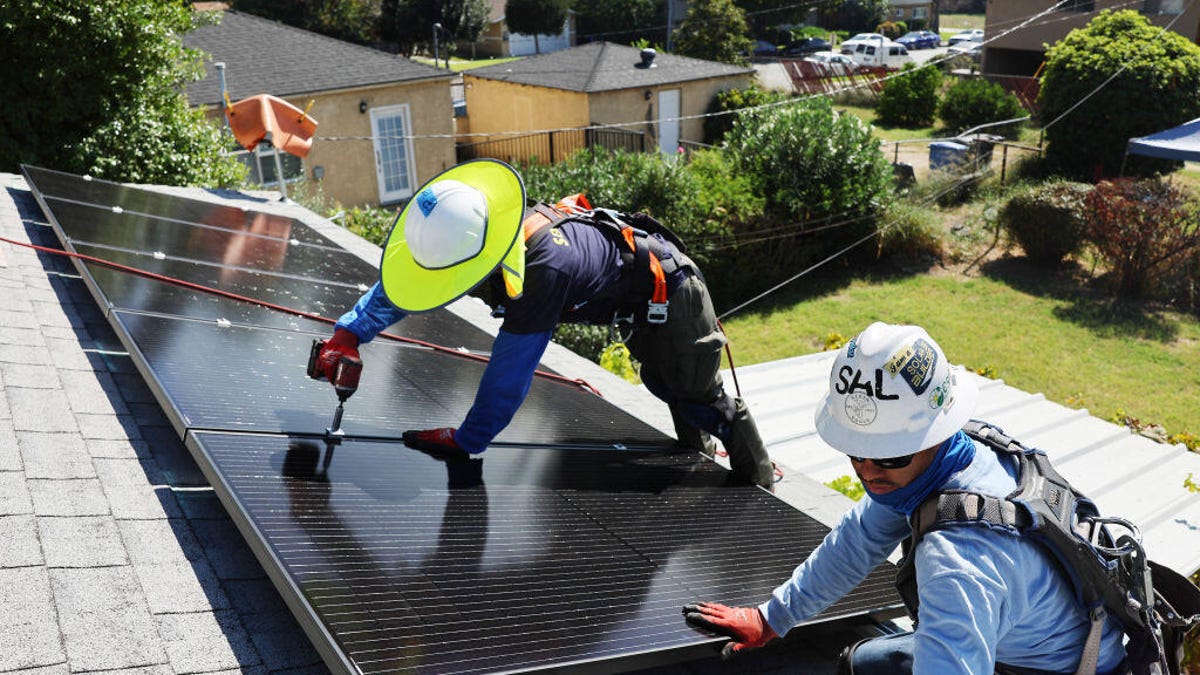The Income Gap Among Households With Solar Panels Is Shrinking, Study Finds
Solar panel owners are still more likely to have higher incomes and live in wealthier states, but a few trends are changing things.

Employees of the nonprofit solar clean energy organization GRID Alternatives install no-cost solar panels on the rooftop of a low-income household in Pomona, California.
Rooftop solar panels continue to be more popular among Americans with above-average incomes, but that trend is changing, according to a new report.
The median household income of a solar adopter in the US was about $117,000 in 2022, researchers from the Lawrence Berkeley National Laboratory found. By contrast, the median income for all households was $69,000, and $86,000 for all owner-occupied households.
While the typical household with solar panels was wealthier than the average household, that trend is changing just a bit. In 2010, the median income for a solar adopting household was $140,000.
Can solar panels save you money?
Interested in understanding the impact solar can have on your home? Enter some basic information below, and we’ll instantly provide a free estimate of your energy savings.
That solar panels are far more likely to be a product for people with higher incomes is no surprise. A solar panel system can cost tens of thousands of dollars -- and you can add another $10,000 if you want to get a backup battery along with it. But the Berkeley Lab's data indicate the rooftop solar market is becoming more equitable.
The solar market is 'broadening' and 'deepening'
The Berkeley Lab researchers identified two general trends causing changes in the income levels of solar adopters. That includes both "broadening," or expansion into states that have lower income levels, and "deepening," or rising rates of solar adoption among lower income households in areas where solar panels are already popular.
The number of new rooftop solar installations in "high-income" states like California have been largely flat since 2015, but more growth has happened in states categorized by the Berkeley Lab as middle and low income. "Middle-income" accounted for 16% of installations in 2022, and "low-income" states made up 21%. Most of those were in Texas, which is categorized as middle-income, and Florida, which is categorized as low-income.
Berkeley Lab attributed this trend in part to falling solar panel prices and new policies and business models that make it easier to go solar.
How to make going solar more financially feasible
A variety of policies have made it easier in recent years for anyone to go solar.
The federal residential clean energy credit, expanded and extended by Congress in 2022, provides people who buy a solar panel installation with 30% of the total cost back on their federal taxes.
At the state level, a variety of programs have popped up in some states aimed at making solar panels more affordable, especially for those with low or moderate incomes. Such programs, often labeled as "Solar for All," will provide additional incentives for those who meet eligibility requirements, and often mean no upfront costs for a solar panel system. Illinois and Maryland are among the states with programs designed at reducing solar costs for low- to moderate-income households.



